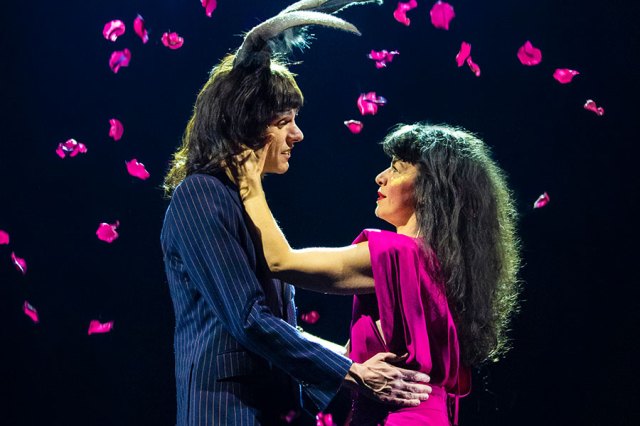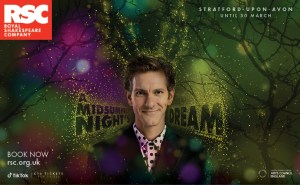
How many times does one have to see A Midsummer Night’s Dream before it becomes, in its own words, “a tedious, brief scene”? The play has been voted the nation’s favourite Shakespeare, but surely there are limits to the variations that can be mined from the sparring lovers or the ridiculous Rude Mechanicals?
And then one happens upon a production that not only breathes new life into the broad comedy, but also finds a freshness that invigorates both cast and audience. Eleanor Rhode’s new version for the RSC does exactly that. At almost three hours’ running time it is not brief, but then neither could it remotely be described as tedious.
Set in a vaguely recent past, Lucy Osborne’s colourful and imaginative designs borrow liberally from the 1960s (Bottom’s suave Carnaby Street tailor, for example) and the 1980s (Lysander’s fabulous mullet and Hippolyta’s power shoulder pads), giving the visuals an energetic freedom that somehow frees up the text as well. Rhode’s occasional playfulness with modern interjections works beautifully in this context and the cast seem to relish the trust that is placed in them with this most cherished of plays.
The look and the sound of the show are vital contributors to its overall success. Will Gregory – an authentic pop star as part of Goldfrapp, inter alia – supplies some wonderfully atmospheric music and songs, which emerge from the action organically rather than being superimposed, as is often the case with Shakespearean productions. Matt Daw’s lighting is coupled with John Bulleid’s illusions to create a world of magic and mystery that is both intriguing and genuinely impressive.
Bally Gill, whose youthful Romeo was much lauded just a few short years ago, has matured into a fine Shakespearean, and in his doubling of a socially awkward Athenian duke and a Mohican-sporting king of the fairies, he shows off both superb comic timing and thoughtful consideration of the well-worn verse.
Other highlights include Mathew Baynton’s restrained but nonetheless hilarious Bottom, deploying all his skills from years of training in the unsurpassed Horrible Histories, and Helen Monks’s multi-talented Quince, delivering keyboard skills, rapping and exasperation with equal agility.
On press night, however, the top accolade must go to Premi Tamang who, due to the last-minute indisposition of Rosie Sheehy, stepped into the pivotal role of Puck, the fairy fixer, as if the part were written for her. With flashes of mystical mischief, teenage world-weariness and physical aptitude, she claimed Puck as her own and had the audience eating out of the palm of her hand – quite an achievement.
Rhode assembles the various strands of the play – gender politics, fantasy and straightforward farce – with a steady hand and a clear eye for the storytelling, and if some of the language gets a little mangled along the way, it’s extremely forgivable given the twinkle that’s wildly apparent in everyone’s eye. A Midsummer Night’s Gleam, one might even say…
















